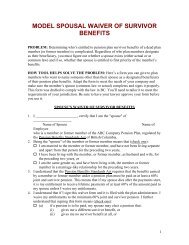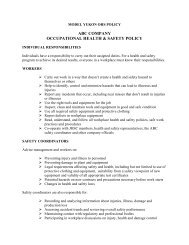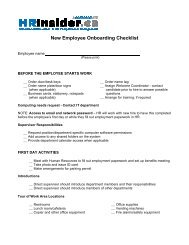ABC COMPANY OVERTIME POLICY DEFINITIONS - HRInsider
ABC COMPANY OVERTIME POLICY DEFINITIONS - HRInsider
ABC COMPANY OVERTIME POLICY DEFINITIONS - HRInsider
Create successful ePaper yourself
Turn your PDF publications into a flip-book with our unique Google optimized e-Paper software.
VERSION 1: (For Union Employees: Based on Alberta Law):<br />
<strong>ABC</strong> <strong>COMPANY</strong> <strong>OVERTIME</strong> <strong>POLICY</strong><br />
<strong>DEFINITIONS</strong><br />
“Appropriate Manager” means [list who at your organization is authorized to approve<br />
overtime work].<br />
“Approval” or “Approved” means the approval of, or approved by, an Appropriate Manager.<br />
“Collective Agreement” means the current <strong>ABC</strong> Company Collective Agreement dated [list<br />
relevant information about your current collective agreement].<br />
“Compensating Time Off in Lieu” or “CTO” means [Note: Describe whatever time-off-inlieu<br />
arrangements you use (which, of course, must be permissible under the employment<br />
standards laws of your jurisdiction), e.g., compensating time off in lieu of Overtime pay.]<br />
“Emergency Situation” means a situation that wasn’t planned and [list the other conditions<br />
justifying the need for employees to work overtime at your organization without prior approval<br />
from a manager, e.g., where necessary to prevent loss of life, injury or property damage].<br />
“Employee” means an individual hired to work for <strong>ABC</strong> Company according to an established<br />
schedule.<br />
“Management,” when used in reference to a position means a person to whom an Employee is<br />
directed to report, and who is responsible for obtaining budgetary approval.<br />
“Overtime” means work that is pre-approved and authorized by management carried out by<br />
Employees in excess of their regular daily or weekly work hours.<br />
“Regular Rate” means the basic hourly rate, or salary equivalent, paid to Employees for their<br />
normal hours of work.<br />
1. PURPOSE<br />
<strong>ABC</strong> Company is committed to ensure that all Employees enjoy a healthy work experience that<br />
allows them to maintain a proper balance between work and life while at the same time enabling<br />
<strong>ABC</strong> Company to achieve its business goals. <strong>ABC</strong> Company also recognizes that there will be<br />
occasions when Overtime will be necessary to meet extraordinary situations. The purpose of this<br />
Policy is to provide for these situations and to ensure that Overtime hours and premiums are:<br />
a. Administered consistently and fairly;
. Recorded accurately;<br />
c. Paid correctly; and<br />
d. Compliant with the terms of the Collective Agreement and the [list<br />
province/jurisdiction] employment standards laws.<br />
2. WHO THIS <strong>POLICY</strong> COVERS<br />
This Policy applies to unionized Employees covered by the Collective Agreement and is<br />
designed to supplement rather than supplant the provisions of the Collective Agreement. This<br />
Policy does not cover Employees who are deemed managers or who are otherwise exempt from<br />
mandatory overtime requirements of the [list province/jurisdiction] employment standards laws.<br />
3. APPROVAL OF <strong>OVERTIME</strong> AND CTO<br />
3.1. Overtime must be pre-approved and authorized by the Appropriate Manager.<br />
3.2. [List positions not eligible for Overtime, e.g., Casual, temporary, temporary relief and parttime<br />
employees] of <strong>ABC</strong> Company are not eligible and will not be authorized to work Overtime.<br />
3.3. Time in excess of normal daily or weekly work hours without prior Approval from<br />
Management will be treated as ineligible for Overtime compensation except in Emergency<br />
Situations. This includes time Employees choose to work:<br />
a. During lunch or rest periods;<br />
b. Upon arriving to work early before scheduled hours; and/or<br />
c. When staying late past scheduled hours.<br />
3.4. CTO must also be pre-approved and used [insert deadline for employees to use<br />
compensating time off in lieu of Overtime pay, e.g., within 3 months of the end of the pay period<br />
in which it’s accumulated.]<br />
3.5. Employee requests to use CTO for time off will be granted only if the Employee has<br />
sufficient CTO credits to cover the time off requested.<br />
3.6. Overtime will be funded by [list, e.g., the department that has budgetary authority].<br />
3.7. Employees who Overtime without prior authorization in an Emergency Situation as<br />
permitted under this Policy must immediately notify the Appropriate Manager of the details of<br />
the Emergency Situation and the number of Overtime hours they worked.<br />
4. BANKING OF <strong>OVERTIME</strong>
4.1. [Describe any banked overtime arrangements followed (which, of course, must be<br />
permissible under your province’s employment standards laws. Example: As provided under<br />
Section VII of the Collective Agreement, <strong>ABC</strong> Company may schedule banked CTO on behalf of<br />
the Employee and advise the Employee at least 3 weeks before the date such banked CTO is to be<br />
taken.]<br />
5. SPECIAL SITUATIONS<br />
5.1. [Describe any other special overtime arrangements in place. Example: Employees<br />
participating in a graduated return to work program or in reduced duties leading to retirement<br />
may work Overtime only as provided under the terms of Section VIII of the Collective<br />
Agreement.]<br />
6. <strong>OVERTIME</strong> PROCEDURES<br />
[Describe your Overtime procedures. What follows is just a sample for illustrative purposes, not<br />
a prescription that every organization must use:]<br />
6.1. All Overtime must be authorized by the <strong>ABC</strong> Company HR Department before the extra<br />
time is worked.<br />
6.2. Whenever possible, Employees who work Overtime will be compensated in the form they<br />
request, either immediately as compensation at time-and-a-half or banked as CTO.<br />
6.3. As required by law, Employees leaving <strong>ABC</strong> Company will be paid all unused banked<br />
Overtime when they leave.<br />
6.4. All Overtime earned under the terms of this Policy must be recorded and approved by the<br />
Appropriate Manager and updated in the <strong>ABC</strong> Company timesheet system.<br />
6.5. As required by law, Employees called back to work to help with an Emergency Situation<br />
will be paid for the call out and any Overtime worked.
VERSION 2: (For Non-Union Employees: Based on ONTARIO Law):<br />
<strong>ABC</strong> <strong>COMPANY</strong> <strong>OVERTIME</strong> <strong>POLICY</strong><br />
1. <strong>ABC</strong> Company seeks to pay in an equitable manner for work performed beyond regular<br />
working hours. It also strives to apply regulations and policies that ensure the sound and efficient<br />
management of its human resources.<br />
OBJECTIVES<br />
2. In accordance with the above principles, <strong>ABC</strong> Company’s objectives are:<br />
a) To keep overtime and additional work to a minimum;<br />
b) To establish rules governing:<br />
<strong>DEFINITIONS</strong><br />
i. Hours of work;<br />
ii. Pay for hours of work<br />
iii. Payment of overtime and additional work applicable to all regular<br />
members of support staff, without exception, except for those specified<br />
in this policy.<br />
3. <strong>OVERTIME</strong>: Overtime applies to the extra hours of work a support staff member puts in<br />
performing the duties of his or her position. They are paid on the basis of the hourly rate of the<br />
position occupied by the employee.<br />
ADDITIONAL WORK: Applies to the work performed by a support staff member outside his or<br />
her normal working hours and in functions pertaining to a position other than his or her own, at<br />
<strong>ABC</strong> Company. This type of work must be paid at the employee’s regular rate, with any<br />
adjustments required to take into account the total hours worked in a week and the application of<br />
an overtime rate. Such work will be allowed as long as there are no adverse effects on the work<br />
performance of the employee during his or her normal hours of work and the person’s immediate<br />
supervisor is informed accordingly.<br />
4. In all instances, the pay granted must comply with this policy.<br />
REGULAR WORKING HOURS<br />
5.1. For support staff receiving an annual salary, the annual average length of the normal work<br />
week is 35 hours, for a total of 1,820 hours a year. From September to May inclusively, the<br />
normal work week is thirty-six and a quarter hours (36 1/4), and the normal daily schedule is<br />
8:45 a.m. to 5 p.m., with an unpaid hour allowed for lunch (generally from noon to 1 p.m.). From<br />
June to August inclusively, the normal work week is thirty-one and a quarter hours (31 1/4), and
the normal daily schedule is from 8:45 a.m. to 4 p.m., with the same one-hour period allowed for<br />
lunch.<br />
5.2. The normal work week for most staff is from Monday to Friday, but regular work schedules<br />
for individuals in some work units may involve regular weekend or evening work.<br />
6.1. For staff of the XYZ Division, who are paid hourly, the average annual normal work week is<br />
forty (40) hours. The work schedules include normal workdays of eight hours divided into day,<br />
evening and night shifts, and are established by the administration of the service in question. For<br />
mail clerks, the average annual normal work week is thirty-six and a quarter hours (36 1/4).<br />
6.2. The work schedules described may be changed occasionally, with the agreement of the staff<br />
member concerned, to meet the needs of <strong>ABC</strong> Company or those of specific employee groups. In<br />
such instances, it is important to comply with the total annual number of hours of work<br />
scheduled for the position.<br />
7. The number of work hours must in all instances comply with current statutes, and in particular<br />
with the Ontario Employment Standards Act.<br />
8.1. According to the Employment Standards Act, no employer may ask an employee to work<br />
more than eight hours a day or forty-eight hours a week without the employee’s agreement; in<br />
any case, the employee must not work more than 60 hours a week. The employee and employer<br />
may cancel this agreement.<br />
8.2. If the employee wishes to cancel an agreement to work more than eight hours a day, he or<br />
she must give two weeks’ notice. The agreement cannot be cancelled if the employment contract<br />
specifies that the regular work day is more than eight hours.<br />
8.3. The employer must give reasonable notice when wishing to cancel an agreement concerning<br />
hours that differ from those stipulated in the Employment Standards Act. The notice period must<br />
be determined in consultation with the Employee Relations Section of the Human Resources<br />
Service.<br />
9. Employees cannot be required to work more than the number of hours specified in paragraph<br />
8.1 without their consent, except during an emergency, as defined in the Employment Standards<br />
Act.<br />
FLEX HOURS<br />
10. <strong>ABC</strong> Company allows for flex hours. Responsibility for establishing flex hours lies with<br />
[list], who must ensure that a sufficient number of employees remain on duty to maintain<br />
essential services during working hours. Managers must remember that requests for flex hours<br />
are not to be unreasonably refused.<br />
11. Flexible schedules must abide by these rules:
a) At least thirty minutes must be granted for lunch;<br />
b) The two daily 15-minute breaks cannot be used to reduce the length of the normal<br />
<strong>ABC</strong> Company workday; and<br />
c) The work schedule requires the HR director’s approval.<br />
12. Flexible schedules do not apply to staff whose regular work schedule differs from the one in<br />
article 5.1.<br />
BREAKS<br />
13. All support staff employees are entitled to two 15-minute breaks every day, one in each half<br />
of the workday, at a time established by the unit managers. <strong>ABC</strong> Company’s goal in allowing<br />
this rest period is to reduce fatigue and stress and to boost morale and performance. However,<br />
telephone and reception services must be maintained during breaks.<br />
<strong>OVERTIME</strong> TERMS AND CONDITIONS<br />
14. Only overtime hours explicitly and directly scheduled and approved by the immediate<br />
supervisor are considered legitimate overtime hours and can be paid under the terms and<br />
conditions in this policy. Employees who work overtime to contend with an emergency that<br />
affects <strong>ABC</strong> Company’s operation must notify their immediate supervisor accordingly without<br />
delay. Unscheduled and unauthorized hours of work by staff at their own discretion or for<br />
personal reasons are not recognized and not paid as overtime under this policy.<br />
15. All support staff members in regular grade-A or lower positions, no matter what their<br />
employment category, are entitled to overtime pay in accordance with this policy.<br />
16. Staff members in regular grade-B positions who are not managers (that is, employees who<br />
have no managerial or supervisory responsibility and whose position is identified as such in the<br />
HR Service database), no matter what the employment category, are eligible for overtime pay, in<br />
accordance with this policy.<br />
17. Staff members in regular grade-B positions who are managers, no matter what their<br />
employment category, are not eligible for overtime pay, but are eligible for a fourth week of<br />
annual leave after three years of continuous service.<br />
18.1. Notwithstanding the provisions of article 17, and subject to the limits established in article<br />
8.1, and up to the maximum number of hours permitted under the Employment Standards Act,<br />
grade-B or higher personnel assigned to a special project involving a considerable amount of<br />
extra work but not being followed by a foreseeable workload reduction over time may by<br />
exception be compensated for the additional work.<br />
Generally, overtime for grades B (managers) to E is managed as follows:<br />
a) Employees in these salary classes can be called on occasionally to work some<br />
overtime without special pay or compensation.
) However, for repetitive peak periods or for special projects and special circumstances<br />
(like in the preceding paragraph) that require a substantial amount of overtime,<br />
members and their dean or director must agree on reasonable compensation, in the<br />
form of time off or extra pay.<br />
c) These agreements must be first approved by the HR Service, to safeguard internal<br />
equity.<br />
REMUNERATION<br />
19. The type of remuneration must be determined before overtime can be authorized.<br />
20. Each hour of overtime work, including any performed on Sunday, is paid at the rate of time<br />
and one-half the regular hourly rate, either in money or in equivalent time off, according to the<br />
terms and conditions specified below and to the provisions of article 14 above. In the calculation<br />
of overtime, leaves of all kinds are excluded.<br />
21. The calculation of overtime excludes weekend and evening premiums.<br />
22. A maximum of fifty hours of overtime, including the time-and-a-half calculation, can be<br />
banked during each calendar year (January to December) and may be taken as time off, at the<br />
employee’s discretion, except for positions that include time remittance and for which there is a<br />
flexible schedule. All overtime beyond these 50 hours must be paid.<br />
23. When overtime is worked for emergencies, as defined in the Employment Standards Act, it<br />
may be added to the number of hours banked.<br />
24. All banked overtime not used up by 31 December of each year is to be paid according to the<br />
number of hours logged in the databases. Furthermore, the December 31 date is deferred until<br />
March 31 for overtime accumulated between October 1 and December 31, although this remains<br />
subject to the 50-hour maximum.<br />
25. Staff members with banked overtime who are transferred must be reimbursed in cash when<br />
they leave the department where the overtime was worked.<br />
26. Staff having worked overtime and wishing to be paid for the hours in question must be paid<br />
no later than the month after the overtime was worked.<br />
RECALL TO WORK AND ON-CALL PAY<br />
27. All staff members whose job makes on-call status essential, and who have been asked to be<br />
on call, whether by means of a pager or a cell phone, and who therefore must be reachable and<br />
available at all times for a designated period are to be paid at the rate of 30 minutes for every<br />
four-hour on-call period. “On call” is defined as any period outside of normal working hours<br />
during which the person is available to answer emergency calls for his or her area and who can<br />
come to work quickly if required. On-call time cannot be accumulated when the service’s<br />
operations are closed. Between 11 p.m. and 6 a.m., only staff members who provide essential
services may be remunerated when necessary. Determining what constitutes essential services is<br />
the responsibility of the HR manager and department managers.<br />
28. Staff members recalled to work 15 minutes or more following the end of the normal workday<br />
receive a minimum of either four hours’ straight time or time-and-a-half for the hours worked,<br />
whichever is highest. When an employee is paid under this article, any accumulation of on-call<br />
time ceases for the period in question.<br />
WEEKEND AND EVENING PREMIUMS<br />
29. Staff whose work schedule requires working evenings or weekends are paid premiums.<br />
These are $0.40 an hour for evening work (between 6 p.m. and 11 p.m.) and $0.54 an hour for<br />
weekend work. The annual base pay for staff with regular evening or weekend schedules is<br />
adjusted proportionately to take into account the hours worked during these periods. When these<br />
periods are worked sporadically, the rates specified here are used to calculate the pay owed.<br />
30. For X department staff who work schedules spanning both a 24-hour-a-day period and a<br />
seven-day-a-week period, premiums are as follows:<br />
a) From Monday to Saturday, from 4 p.m. to midnight: $0.40, from one minute after<br />
midnight to 8 a.m.: $0.49.<br />
b) Saturday: from 8 a.m. to 4 p.m.: $0.40.<br />
c) Sunday from 8 a.m. to 4 p.m.: $0.54; from 4 p.m. to midnight: $0.86, from one<br />
minute after midnight to 8 a.m.: $0.97.<br />
d) These rates apply to regular and term employees, except for parking-lot attendants.<br />
SCOPE OF APPLICATION<br />
31. This policy applies to regular employees and to situations not covered by a collective<br />
agreement.<br />
EXCEPTION<br />
32. No exception may be made to this policy without the written consent of the <strong>ABC</strong> Company<br />
HR manager.


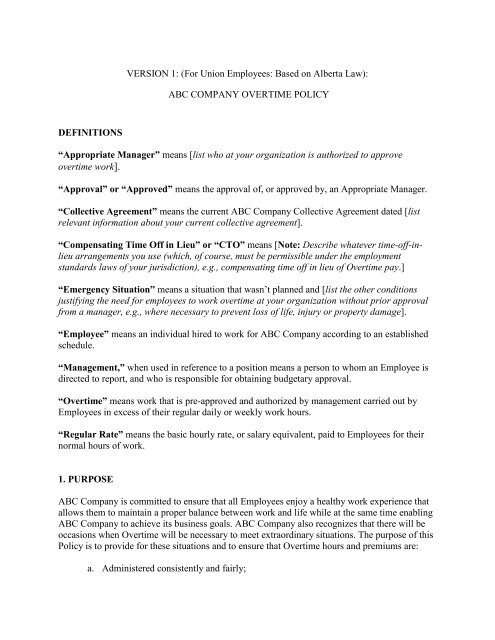
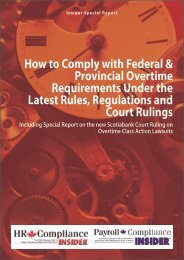

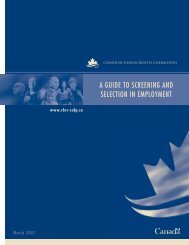

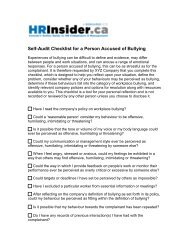
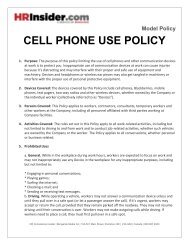
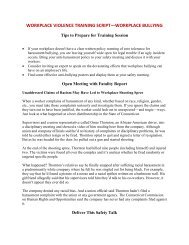
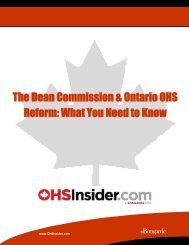
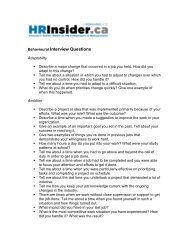
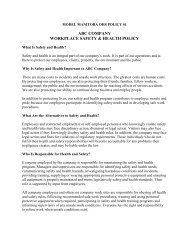
![[company name] workplace violence prevention program - HRInsider](https://img.yumpu.com/35452041/1/190x245/company-name-workplace-violence-prevention-program-hrinsider.jpg?quality=85)
